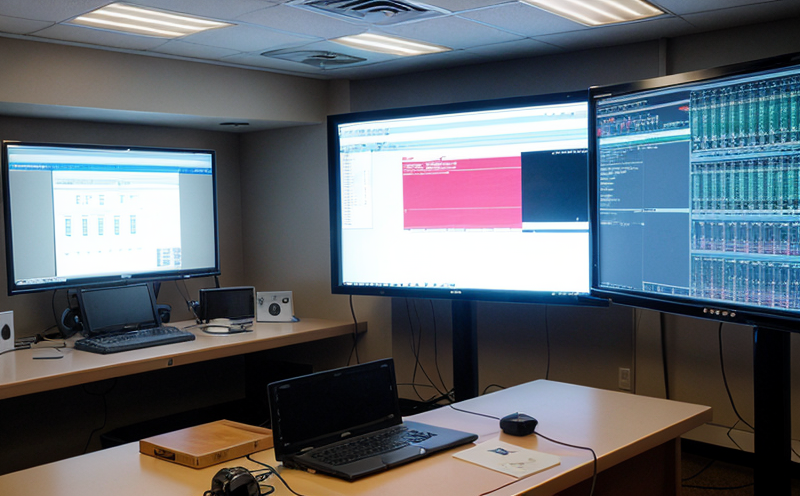EN 50238 Compatibility Testing of ERTMS/ETCS Systems
The European Rail Traffic Management System (ERTMS) and the European Train Control System (ETCS), collectively referred to as ERTMS/ETCS, are critical components that ensure safe and efficient railway operations. The EN 50238 standard plays a pivotal role in ensuring the interoperability of these systems across different rail networks within Europe and beyond. This service focuses on the comprehensive testing procedures required to comply with EN 50238, which guarantees that ERTMS/ETCS systems operate seamlessly together, regardless of their geographical location or manufacturer.
The railway industry is characterized by stringent safety requirements and complex operational environments. Ensuring compatibility between different ERTMS/ETCS systems is vital for the seamless functioning of modern rail networks. This service ensures that all components interact correctly, preventing potential disruptions in service and ensuring passenger and freight safety. The testing process involves rigorous evaluation of communication protocols, hardware interfaces, software functionalities, and system integration.
Our EN 50238 compatibility testing services are tailored to meet the specific needs of quality managers, compliance officers, R&D engineers, and procurement teams involved in the development and deployment of ERTMS/ETCS systems. By adhering strictly to this standard, we help our clients ensure that their products are not only compliant with European regulations but also compatible across diverse railway environments.
The testing process typically involves several key steps:
- System configuration verification
- Communication protocol validation
- Hardware interface assessment
- Software functionality evaluation
- Integration testing of components
The results of our EN 50238 compatibility tests provide detailed reports that include:
- Pass/Fail criteria based on standard requirements
- Detailed analysis of tested parameters
- Recommendations for improvements or modifications
- Compliance with relevant international standards (ISO, IEC)
In summary, our EN 50238 compatibility testing service ensures that ERTMS/ETCS systems meet stringent interoperability requirements. This service is essential for maintaining high operational standards and contributing to the overall safety and efficiency of railway networks across Europe and globally.
Applied Standards
| Standard | Description |
|---|---|
| EN 50238:2019 | Defines the requirements for the interoperability of ERTMS/ETCS systems, ensuring they can operate harmoniously across different railway networks. |
| ISO/IEC 17025:2017 | Accreditation standard for testing and calibration laboratories to ensure the competence of test facilities. |
| ETCS-034 | Describes the communication protocols used in ERTMS/ETCS systems. |
| ETSI TS 102 895 v.2.6.1 | Specifications for the ERTMS/ETCS system architecture and interfaces. |
The testing process is guided by these standards, ensuring that all components of an ERTMS/ETCS system are thoroughly evaluated against internationally recognized benchmarks. This approach not only enhances reliability but also ensures that the tested systems can seamlessly integrate into existing rail networks.
International Acceptance and Recognition
The EN 50238 standard is widely accepted in Europe, especially by national railway operators and regulatory bodies. The European Union's interoperability directive (EUREGIO) mandates the use of ERTMS/ETCS systems for new rail infrastructure projects across member states. This ensures that all ERTMS/ETCS systems are compatible with one another, promoting seamless integration into existing networks.
Several countries outside Europe have also adopted EN 50238 as a standard for testing ERTMS/ETCS systems:
- Australia
- Japan
- New Zealand
- Singapore
- South Korea
The international acceptance of this standard underscores its significance in ensuring that ERTMS/ETCS systems operate efficiently and safely across diverse environments. This global recognition enhances the reliability and trustworthiness of the tested systems, facilitating smoother integration into various rail networks worldwide.
Competitive Advantage and Market Impact
Adhering to EN 50238 compatibility testing provides significant competitive advantages for railway equipment manufacturers and service providers. By ensuring that their products meet the highest international standards, companies can:
- Increase market share by offering reliable, interoperable ERTMS/ETCS systems.
- Gain a reputation as leaders in rail technology innovation and compliance.
- Attract more clients from diverse geographical regions, enhancing global presence.
The market impact of EN 50238 compatibility testing is profound. It not only enhances safety but also promotes sustainable rail transportation systems. By fostering interoperability, this standard supports the development of a unified European railway network, which in turn contributes to reduced emissions and more efficient use of resources. This aligns with the broader goals of environmental sustainability and economic growth.
As the global demand for high-quality railway infrastructure continues to grow, EN 50238 compatibility testing remains a critical service that ensures compliance with international standards and enhances market competitiveness.





